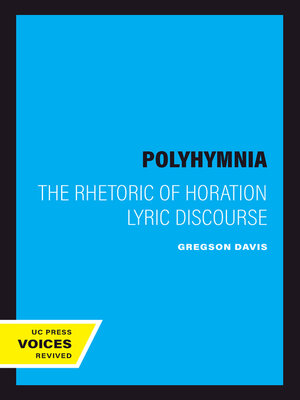
Sign up to save your library
With an OverDrive account, you can save your favorite libraries for at-a-glance information about availability. Find out more about OverDrive accounts.
Find this title in Libby, the library reading app by OverDrive.



Search for a digital library with this title
Title found at these libraries:
| Loading... |
Horace's Odes have a surface translucency that belies their rhetorical sophistication. Gregson Davis brings together recent trends in the study of Augustan poetry and critical theory and deftly applies them to individual poems. Exploring four rhetorical strategies—what he calls modes of assimilation, authentication, consolation, and praise and dispraise—Davis produces enlightening, new interpretations of this classic work.
Polyhymnia, named after one of the Muses invoked in Horace's opening poem, revises the common image of Horace as a complacent, uncomplicated, and basically superficial singer. Focusing on the artistic persona—the lyric "self" that is constituted in the text—Davis explores how the lyric speaker constructs subtle "arguments" whose building-blocks are topoi, recurrent motifs, and generic conventions. By examining the substructure of lyric argument in groupings of poems sharing similar strategies, the author discloses the major principles that inform Horatian lyric composition.
This title is part of UC Press's Voices Revived program, which commemorates University of California Press's mission to seek out and cultivate the brightest minds and give them voice, reach, and impact. Drawing on a backlist dating to 1893, Voices Revived makes high-quality, peer-reviewed scholarship accessible once again using print-on-demand technology. This title was originally published in 1991.
Horace's Odes have a surface translucency that belies their rhetorical sophistication. Gregson Davis brings together recent trends in the study of Augustan poetry and critical theory and deftly applies them to individual poems. Exploring four rheto
Polyhymnia, named after one of the Muses invoked in Horace's opening poem, revises the common image of Horace as a complacent, uncomplicated, and basically superficial singer. Focusing on the artistic persona—the lyric "self" that is constituted in the text—Davis explores how the lyric speaker constructs subtle "arguments" whose building-blocks are topoi, recurrent motifs, and generic conventions. By examining the substructure of lyric argument in groupings of poems sharing similar strategies, the author discloses the major principles that inform Horatian lyric composition.
This title is part of UC Press's Voices Revived program, which commemorates University of California Press's mission to seek out and cultivate the brightest minds and give them voice, reach, and impact. Drawing on a backlist dating to 1893, Voices Revived makes high-quality, peer-reviewed scholarship accessible once again using print-on-demand technology. This title was originally published in 1991.
Horace's Odes have a surface translucency that belies their rhetorical sophistication. Gregson Davis brings together recent trends in the study of Augustan poetry and critical theory and deftly applies them to individual poems. Exploring four rheto






